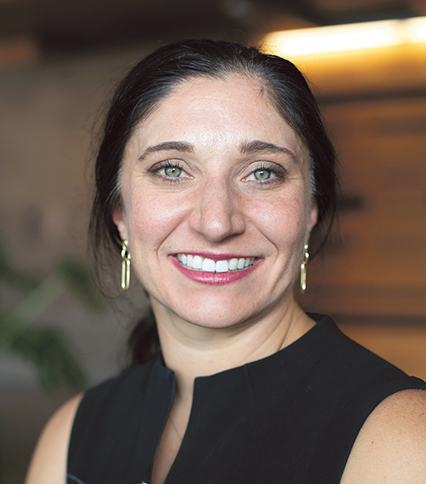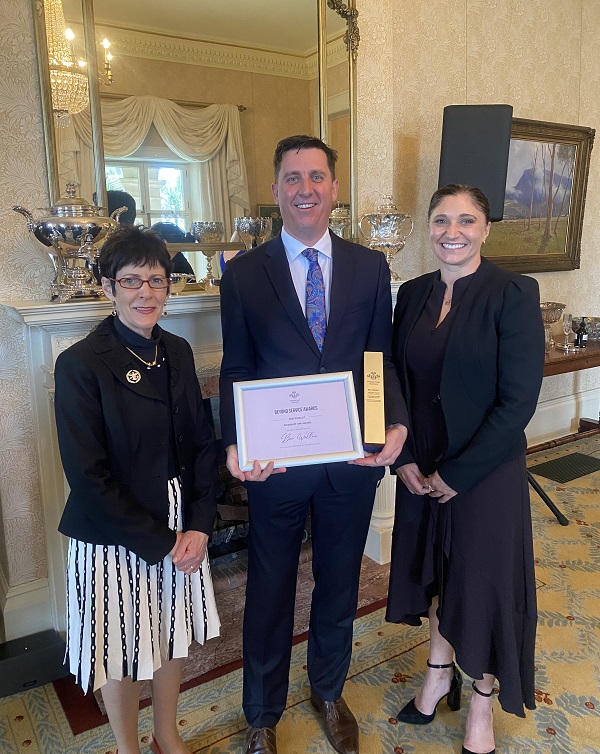Employment Awards shine a light on partners
Commissioner Gwene Cherne
Veteran Family Advocate

Each year the Prime Minister’s National Veterans’ Employment Awards shine a light on the depth and breadth of talent in our veteran community. This year, for the first time, there were also specific categories for Partner Employees and Partner Entrepreneurs included in the Awards.
This was great to see. Partners are a diverse and skilled cohort with experiences in many occupations and industries. Yet, many face barriers to meaningful employment.
Historically, employment within military families was based on the breadwinner/homemaker model. Even today, when the majority of Australian households are dual income, partners are often viewed as supporting the serving member or veteran. Their careers often play second fiddle to their partner’s. They are enablers, trailing spouses, following their partner from one posting to the next.
Even though contemporary attitudes have changed, barriers to finding rewarding work remain. Katie Vidal, who won Partner Employee of the Year in this year’s awards, noted that in 17 years she moved nine times with her partner, which included two stints overseas. This disrupts careers. People lose professional contacts and networks. They often find themselves in locations with high unemployment or where the job they are trained in does not exist. Other barriers to finding suitable employment also include family responsibilities and employer perceptions towards people in ADF families.
Whatever the cause, the outcome is the same – many partners end up in work that does not meet their needs or desires. We know being unemployed, or stuck in a bad job has negative impacts. It affects everything from feelings of self-worth and financial security through to community connection.
The issue of partner employment can also have an impact on the ADF’s ability to retain personnel. The United Kingdom’s Armed Forces Families’ Strategy noted that one of the key push factors personnel report when deciding to leave is the difficulty their partner experiences when it comes to finding employment. This shouldn’t come as a surprise. After all, how attractive is a job if it curtails your partner’s career ambitions?
While this is a problem, it has created an opportunity for employers. There is an untapped talent pool searching for employment. To thrive in military life, partners develop skill sets that many employers value: resilience, flexibility, resourcefulness and a community focused mind-set. They have the ability to work well under pressure and balance stress. They also have a willingness to jump right in and learn new skills on the fly. The challenge is connecting ADF partners with the right job.
In the past, partner employment was an invisible issue in Australia. But fast forward to today and that is changing. There is now a range of options and services, delivered across government, non-profit and for-profit organisations.
To list a few, Defence Families Australia, Soldier On, RSL Australia and RSL Queensland Employment Programs, Bravery Trust, The Prince’s Trust Australia, Wandering Warriors all have support programs. In addition, there is the ADF’s Partner Employment Assistance Program and the Department of Workplace Relations Self-Employment Assistance program. The Australian Catholic University and Wollongong University, as well as some state and territory government supported programs (eg: TAFE NSW Veteran Skills), assist with further education. And there is also the partner employment support offered from Veteran Employer Commitment signatories such as Westpac, BHP and BAE Systems.
While it is fantastic to see so much growth in support for partner employment, many people may not be aware of the help that is out there. One of the best first steps you can take is to get in touch with your local Veterans’ and Families’ Hub. The Hubs hold a wealth of information on what support is available and how to access it. To find your nearest Hub, go to dva.gov.au.
The range of employment support for partners has expanded greatly, but there is still more work to do. Often the services organisations offer have been added or integrated into existing veteran employment programs. It is one thing to add families to veteran-centred career programs, but it is another thing entirely to create programs specifically designed for Defence and veteran partners.
I recognise this takes work, and requires significant collaboration across a range of organisations. A great starting point was a focus on partner and family employment during the Veteran Employment Roundtables Minister Keogh held in the lead up to the Jobs and Skills Summit in September. I look forward to seeing the Employment White Paper which is being developed and will build on the Summit’s outcomes.
Increasingly, the issue of partner employment is being recognised and acted upon here in Australia and around the world. The first International Military Spouse Employment Summit 2022, organised by Australian Amanda McCue, assists in building coalitions, programs, and research that help us understand barriers to meaningful and consistent employment for military spouses.
This is an important step, and we need to use the momentum of events like this to create change. In the short term, we can assist ADF and veteran families by improving access to information regarding existing services. In the longer term, I am keen for us to consider how the efforts of everyone who provides partner support can be improved. I believe partner employment needs to be aligned, but differentiated from veteran employment activity. We must create and fund programs focused on partners and spouses of current serving and former serving families. We need support from Defence, DVA, ESOs and industry to make this work and to move from awareness to action.
We must provide consistent advocacy and messaging to ensure employers recognise the value of partner employment. Hiring fairs, networking events, mentoring opportunities for partners, spouses and widows will support this message. And finally, we need to put our words into action. If I have learned one thing over the last five years, it is that we need more people with lived experience at all levels of our organisations.
Dismantling employment barriers and providing career support to partners opens up opportunities for partners, their families, the ADF, employers and the community. Our ADF families have a lot to offer, and with the right help, there is no limit to what they can achieve.

Gwen Cherne with Her Excellency Linda Hurley and Paul Broadbridge, Australian Partners of Defence (APOD) Chief Executive Officer, who accepted the Prince’s Trust Defence Family Business Award, which was posthumously awarded to his fiancé Bec Waller. Bec founded APOD in 2012 and today APOD works with more than 3,000 brands and 21,000 stores, supporting more than 127,000 Defence and veteran military families and recognised veteran-owned businesses.
